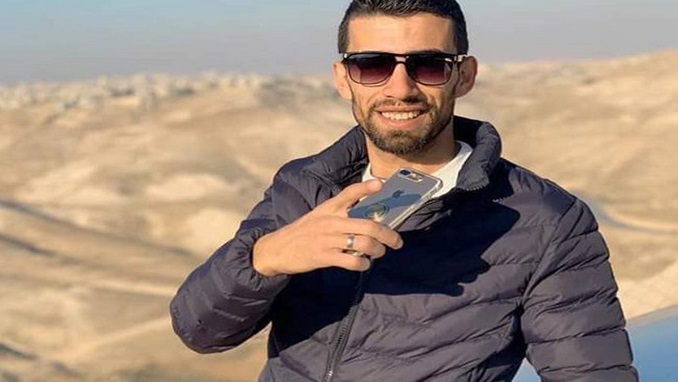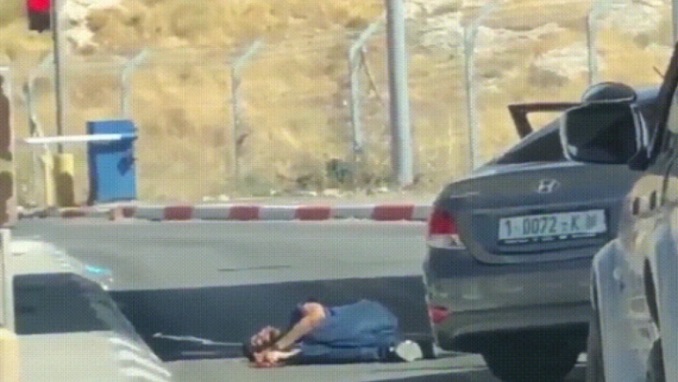Further doubts have been raised over Israel’s killing of Ahmad Erekat who was shot dead in June at an Israeli military checkpoint near the town of Abu Dis, east of Jerusalem. Israeli police claimed that Erekat was a “terrorist” conducting an attack, Middle East Monitor reports.
On 23 June 2020, Erekat, a 26-year-old Palestinian, was shot by Israeli forces after his car crashed into a booth at the ‘Container’ checkpoint between Jerusalem and Bethlehem in the occupied West Bank.
Erekat, who was the nephew of then-Palestinian Liberation Organization (PLO) Secretary-General Saeb Erekat, was on his way to pick his mother and sisters up, who were at a beauty salon getting ready for his sister’s wedding that evening, when he was killed. His own wedding was due to take place two weeks later.
“This young man was killed in cold blood. Tonight was his sister’s wedding. What the occupation forces claim, that he was trying to run someone over, is a lie” said Saeb Erekat, secretary-general of the Palestine Liberation Organisation.
Erekat told the AFP news agency that his nephew had been “executed” by the Israeli police, adding that he held Israeli Prime Minister Benjamin Netanyahu responsible for “this crime”.

Israeli security forces said Ahmed had attempted to ram his vehicle into a soldier at the checkpoint before they opened fire.But a new report by Forensic Architecture, a British research body based at Goldsmiths, University of London, has challenged the Israeli narrative following a “frame-by-frame” analysis of the security camera footage which clearly showed Erekat’s movement prior to his killing.
The report found that Erekat posed no “immediate threat” to Israeli soldiers; that he was denied medical treatment after he was fatally shot; his body was treated in a “degrading” manner and that following his death his family was subjected to collective punishment.
Details of the report, which includes the reconstruction of the scene using available film, including security footage published by police, cast “significant doubt” over the Israeli narrative. It cited collision experts who concluded that Erekat’s car was not accelerating significantly.
“Our analysis also comes across evidence that raises the possibility that Erekat braked before impact with the checkpoint,” the report said.
Collision expert Dr Jeremy J Bauer concluded that “the driver did not rapidly accelerate into the checkpoint. Had the driver truly wanted to maximize the chance that he would surprise the guards and strike them with his vehicle, he could have accelerated to the maximum capacity of the vehicle.”
“The car’s speed did not exceed 15 km/hr [9.3 miles per hour] – its acceleration was constant and low throughout, implying that there was no sudden attempt to speed up.”
After the impact, video footage shows Erekat leaving the vehicle unarmed and moving away from the soldiers, raising his hands in the air. He is first shot when standing around four metres away from the nearest soldier. He then continues to move backwards as he falls to the ground. Israeli soldiers fired six shots in the space of two seconds.
Detailed analysis of the footage contradicts the Israeli army’s claim and confirms that Erekat did not pose any immediate threat. It also found that Israeli forces offered no immediate medical aid, even while Erekat was clearly alive. The killing amounted to an extrajudicial execution, it concluded.
After the report was released, Erekat’s family appealed to the international community to help secure the release of his body, which remains with Israel. Omar Shakir, the Israel and Palestine director of Human Rights Watch, said withholding Erekat’s body amounted to unlawful collective punishment.
For years, Palestinian and Israeli rights groups have accused Israel of using excessive force against those seen as a threat to its forces, deploying deadly force against those who could have been apprehended alive.
On January 31, an Israeli soldier shot dead a Palestinian suspected of attempting an attack on troops also in the West Bank. Four days before that, a teenager was also shot and killed near the Jewish settlement of Ariel in the occupied West Bank.
Last year, Israeli security forces were accused of killing at least 27 Palestinians across occupied territories and in Israel, according to Israeli rights group B’Tselem. In at least 11 of the 16 killings investigated by B’Tselem in the occupied West Bank, the Palestinians “posed no threat to the lives of the forces” or any other person at the time they were shot.
Meanwhile, the Israeli army said that it had apprehended “suspects” who reportedly tried to carry out a “car-ramming and shooting attack” against its troops last month in the city of Jenin in the occupied West Bank. The report did not say how many suspects were arrested.
